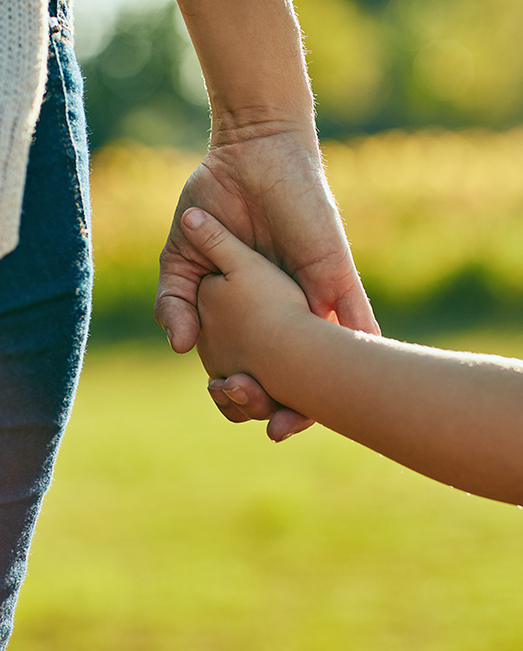Global
Copyright@ Australian Catholic University 1998-2026 | ABN 15 050 192 660 CRICOS registered provider: 00004G | PRV12008
Copyright@ Australian Catholic University 1998-2026 | ABN 15 050 192 660 CRICOS registered provider: 00004G | PRV12008

“The slap seemed to echo. It cracked the twilight. The little boy looked up at the man in shock. There was a long silence. It was as if he could not comprehend what had occurred, how the man’s action and the pain he was beginning to feel coincided. The moment broke, the boy’s face crumpled … when the tears began to fall, they fell silently.”
In his popular novel The Slap, Australian author Christos Tsiolkas describes the outcry when a man smacks a recalcitrant three-year-old boy at a backyard barbecue. Crucial to the story is the fact that the boy was not the man’s son – if he had been, there would likely be no scandal and no repercussions, as it’s still legal for Australian parents to use reasonable force to discipline their children.
Despite the lawfulness of the parenting practice, it is much more frowned upon than it used to be. And yet, it remains alarmingly common.
Early findings of the Australian Child Maltreatment Study (ACMS) show that 61 per cent of people aged between 16 and 24 were physically hit for discipline during childhood.
“It comes as a surprise, both for the general public but also for people researching in the child abuse and neglect space, that something we know is so harmful is still happening at such a high rate,” says Professor Daryl Higgins, one of 10 chief investigators in the ground-breaking study, which aims to identify for the first time how many Australians have experienced child abuse and neglect.
“Research clearly shows that physical punishment doesn’t have any positive associations, other than immediate compliance with a parent’s desires, so it is quite shocking that so many young people experienced this form of discipline on multiple occasions during childhood.”
The ACMS also shows that attitudes towards physical discipline have changed. Drawing from a nationally representative sample of 3,500 people aged 16 to 24, it found that a mere 15 per cent viewed corporal punishment as necessary to properly raise children.
But while it’s rare for younger people to condone the use of physical punishment, almost 40 per cent of those aged over 65 say it’s still a necessary part of parenting.
The research doesn’t explore the reasons why these people believe hitting is an acceptable disciplining tool; however, a classic line of reasoning is: “I was smacked as a child and I turned out fine.”
Experts tend to respond strongly against this argument, identifying it as an anecdotal fallacy.
“It’s similar to somebody saying, ‘Well, I have smoked most of my life and I haven’t got lung cancer’,” says Professor Higgins, who has researched child abuse impacts and prevention for almost three decades, and is Director of ACU’s Institute of Child Protection Studies.
“That may be true – there may well be individuals who have smoked for many years and haven’t got lung cancer – but it doesn’t take away from the very clear scientific evidence that lung cancer is linked to smoking.
“The same is true for corporal punishment. We have very clear evidence that hitting is harmful to children. In our study alone, it almost doubled the risk of mental health problems for young people up to age 24, and that finding is consistent with the broader literature on the effects of corporal punishment. There are no positive outcomes and there’s a range of negative outcomes – and that’s why we say to parents that it’s never okay to hit your children.”
Over several decades, a vast body of research has shown that physical punishment is a neurobiological stressor that can have many negative long-term consequences: depression, anxiety, substance abuse and antisocial behaviour, to name a few.
So it is perhaps unsurprising that the early findings of the ACMS also showed strong links between maltreatment in childhood and subsequent mental health issues.
The study found that young people who experienced physical punishment were more likely to have clinical major depressive disorder and generalised anxiety disorder – although this was partly related to other experiences of child maltreatment, including harsh parental reactions and insufficient support.
“We know that the use of aggressive and punitive parenting practices are likely to disrupt the positive emotional bond between a parent and their child,” says Professor Higgins, a registered psychologist whose research focuses on public health approaches to protecting children.
“Children may learn to fear the parent or caregiver, and that can affect the quality and the nature of what otherwise might have been a positive bond.”
That is not to say that every parent who uses physical punishment has a negative relationship with their child. What the research clearly shows, however, is that hitting, pushing and other aggressive activities often adversely affect a child’s development into adulthood.

It is also important to note that previous research has shown that even milder forms of punishment can be both harmful and ineffective.
“There’s no evidence to show that smacking is ever an effective parenting strategy,” says Professor Higgins, while conceding that parenting is often a challenging endeavour that is high on emotion.
“It’s certainly difficult to know how to manage your own emotions in certain situations, but there’s simply nothing in the research that supports a particular tolerance for a small amount of violence towards children. As a society, we are really clear that violence is not okay in other relationships and other contexts, so why do we make excuses for it within the context of parenting?”
Furthermore, why does Australia’s legal system continue to support an outdated parenting practice?
According to Professor Higgins, it is partly to do with the notion of intruding on what parents see as their right to discipline their children in whichever way they like.
“It’s seen as another intrusion on our private lives – and yet, in other areas like regulating the wearing of seat belts or child-specific car seats, we’ve come to accept this small incursion on our ability to make personal choices about how we want to drive in a car,” he says.
“There’s no groundswell of parents standing up to fight for their rights to choose how children travel in cars. We need to have a similar approach to this particular element of caring for children, because we have the evidence to show that physically disciplining children is neither safe nor effective, and we have many alternative parenting practices.”
Since the late 1970s, more than 60 countries (including New Zealand) have outlawed all forms of corporal punishment, acknowledging that it violates a child’s right to live a life free of violence.
Along with other parenting and family researchers, Professor Higgins is now calling for regulatory change to make it a criminal offence for Australian parents to smack their children.
The experts recognise, however, that law reform on its own is not enough – education is also vital.
Says Professor Higgins: “Changing the legislation is important because it signals the right thing to do and makes it very clear that there are no excuses for engaging in this harmful behaviour towards children. But even more importantly, we need campaigns to change community attitudes and provide access to evidence-based parenting programs and supports. We need to show parents that there are positive practices and more effective methods of raising and disciplining their children.”
Most experts acknowledge that there is no ‘one-size-fits-all’ approach to parenting and child behaviour management: there are different styles to suit different parents and different children.
Professor Higgins likens it to choosing a child car seat that complies with legal standards.
“You can choose whichever brand you like, as long as it has all those key components that make it comply with the standards,” he says. “The same might be true with parenting programs – there are lots of evidence-based programs and supports for nonviolent parenting, and parents can choose the one that suits their family best. Some parents will require very minimal intervention and support, while others will require a much more intensive program, particularly if they’re raising children with a variety of needs and at different age groups.”
Professor Higgins recently teamed up with child psychologist Professor Sophie Havighurst to publish an article on The Conversation outlining some general guidelines for positive parenting.
Drawing on research they both were involved in, they offer evidence-based strategies for helping children to regulate their behaviour, work through their emotions and solve problems. We summarise some of the main points here:
1. Make your expectations clear to your child, and try to be consistent.
2. If your child crosses a line, pause before you react.
3. When you don’t manage situations well, make amends.
4. Validate your child’s emotions and explore the feelings behind their behaviour.
5. Talk through problems when everyone is calm, rather than in the heat of the moment.
6. Support children to take responsibility, and help them to contribute to problem-solving.
7. When your child breaks rules and things go wrong, explore the natural consequences.
Professor Higgins also points to the Raising Children Network as a reliable resource for parents with a range of needs and circumstances.
Professor Daryl Higgins is Director of the Institute of Child Protection Studies, which aims to enhance outcomes for children and families through quality research. Professor Higgins researches child abuse prevalence and impacts, including public health approaches to prevention.

He has contributed to some 300 publications, including more than 85 peer-review journal articles and 600 presentations and media engagements.
The national campaign to end physical punishment of children now has an online petition.
Learn more about ACU.
Copyright@ Australian Catholic University 1998-2026 | ABN 15 050 192 660 CRICOS registered provider: 00004G | PRV12008